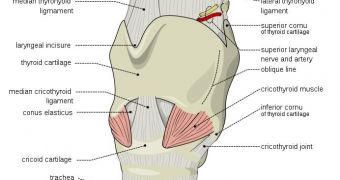As stem cell research is currently making impressive headway in the creation of artificial organs, doctors in the UK are starting to ponder the ethical implications of performing voice box transplants. This type of surgical procedure refers to replacing a human larynx, the organ that is responsible for giving each man and woman on the planet their individual voice. Cancer and violent trauma are the main reasons why nearly 1,000 people in the UK lose their voice boxes every year. For them, a transplant is the only way to regain their ability to speak.
On the other hand, a team of scientists believe that they may be able to perform the operation without the patient having to take immuno-suppressive medication to inhibit their body's natural defenses, so that the transplant won't get rejected. The trick is to use the patient's own stem cells for the procedure. The organ that needs replacing is harvested from a newly-deceased patient, and is then stripped of all its own cells. Thus, all that remains is a clean scaffolding, on which the patient's own stem cells are grown, using a bioreactor.
When the organ is ready, it's simply placed inside the receiver's body, which has no problem in accepting it, because it's not viewed as a foreign object. This type of surgery was used successfully on one occasion, when a woman received a new windpipe, constructed from her own cells. She never had to take strong medication to force her body to accept the implant. Other transplant patients, such as those who get a new heart, a lung, or a kidney, need to take them, because, if not, there's a very high chance that the body will reject the new organ.
As side-effects, these drugs inhibit the immune system, which means that the person is left completely defenceless even against the most harmless bacteria. Countless infections can find their way into the body, left unchecked by the suppressed immune system. Doctors would surely welcome methods that would allow them to bypass this serious issue, and keep the patients out of harm's way.
“We, as a task force, have to ask ourselves whether we are finally entering the right window where a marriage of technology and of need mandates that we can go forward with this procedure. Before now, the prevailing view has been that the balance has been strongly in favor of not going ahead. But we feel there have been sufficient technological advances to make us seriously revisit the case for developing and making routine this procedure. We have to ask ourselves is it right to subject a patient to the risks of surgery for a procedure which is not life-saving,” University College London professor Martin Birchall, who is a member of the UK task force appointed to clear the dilemma around such procedures, says.

 14 DAY TRIAL //
14 DAY TRIAL //